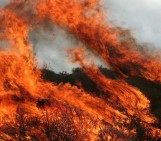By Marc Oliva
The Mediterranean Environmental Research Group, (GRAM) from the University of Barcelona has over 20 years of working experience in the field of the effects of forest fires on soil properties. In 1998 the doctoral thesis entitled “Fire effects on soil properties, the role of fire intensity” carried out by Xavier Úbeda emphasized the importance of fire intensity impacts on soil physico-chemical properties and the consequent implications, as the increase of runoff and erosion in post-fire environments. From this thesis some papers were published in national and international journals. This work was funded by two European research projects related to forest fires, as the “Post fire soil and vegetation dynamics in natural and afforested areas in Southern Europe: The role of fire intensity.” The most important results were the reaffirmation of the importance of fire intensity impacts on soil properties, the increase of erosion and the implications on vegetation recuperation.

Plot located in a urban-forest interface area (see www.ub.edu/gram).
In the last twelve years, the GRAM members worked intensively in the study of prescribed fire impacts on soils. Samples were collected before, immediately after and one year after the prescribed fire experiments in order to observe the impact of this type of landscape management on soil properties, mainly in nutrients behavior. This research was possible through collaboration with the GRAF (Grup de Recolzament to Actuacions and Forestry) from the Generalitat de Catalunya, which carries more than twelve years conducting controlled burns for forest management. Two projects from Spanish Ministry have funded this research: “Alterations of environmental quality in fire-affected soils in Mediterranean environments. The study of hydrophobicity, and development of new techniques to evaluate, and mitigate degradation“and the project: “Assessment of the quality of Mediterranean soils affected by the heat to medium and long term, applying an index of environmental quality“. From these projects, two theses were directed by the person who signs this petition (Dr. Xavier Ubeda). Both were defended in 2010. Luís Outeiro: “Geostatistics and environmental management; studies and applications of the spatial and temporal variability in soil and water “and Paulo Pereira:” Effects of fire temperatures on the chemical and physical characteristics of the Mediterranean species ash and their effect on water quality”. From the thesis of Luis the most relevant results were that based on geostatistical analysis, that low-intensity prescribed fires do not cause important variations on soil properties, but the repetition of this technique can be harmful, if carried out in a short time period. From the thesis of Paulo it was observed that fire temperatures and severity have an important effect on the ash physico-chemical properties, which will influence temporarily the type and amount of nutrients in the soil and available to landscape recuperation.

Studies on soil erosion (see www.ub.edu/gram).
In the project funded by the Ministry of Environment of the Government of France with the title “Dynamique des paysages, érosion développement durable et dans les montagnes méditerranéennes” some interviews were carried out with stakeholders engaged in forest management. The stakeholder’s interviewed were staff from councils and consortia, councils, Forest Ownership Center and Forest Technology Centre of Catalonia. Using these interviews, Roser Rodriguez is currently doing a doctoral thesis entitled “Socioecology wildfire: an approach to environmental sociology wildfires central Catalonia.”
The GRAM has organized several national and international conferences, as the ‘ International Meeting of Fire Effects on Soil Properties “held in 2007 in Barcelona (http://www.fire.uni-freiburg.de/course/meeting/2007/meet2007_04.htm) and in 2013 in Vilnius (https://sites.google.com/site/fespivvilnius/). Other international congresses were organized by the group in several European Geoscience Assemblies.
The Members of the group have participated as “guest editor” in three special issues: “Fire Effects on Soil Properties” Catena. 2008 Vol 74 Issue 3, “Fire Effects on Soil Properties: Forest Fires and Prescribed Fires”. Environmental Research. 2011 Vol. 111. Issue 2 and “Incendis and Forestry” 2012. Treballs of the Catalan Society of Geography. Other three Special issues are ongoing, “The role of ash in fire-affected ecosystems: A physical, chemical and biological approach (Catena)”, “Soil processes in cold-climate environments (Solid Earth)” and “Soil mapping, classification, and modelling: history and future directions (Geoderma)”.
More information on the website of GRAM Group (www.ub.edu/gram).
This post has been published also in G-Soil.

